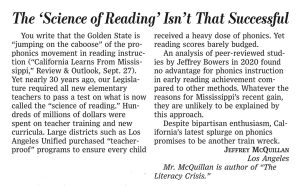I schooled the Wall Street Journal editorial page writers in a letter published in today’s (Oct. 3, 2025) edition (see image, link, & text below). The Journal had applauded California’s recent adoption of (more) phonics teaching (see link below). The writers were apparently unaware that California went all in on phonics back in the 1990s, with predictably disappointing results. This is not our first phonics rodeo.
The current poster child for phonics is the state of Mississippi, which has seen a significant bump in its 4th-grade reading scores since 2013. Left unsaid in this “Mississippi miracle” story is that the state also adopted a number of other changes, any one of which could be responsible for their success.
The only way to know what causes reading scores to rise is to conduct an actual experiment. And, as I point out in my letter, when you properly test the effects of phonics vs. other methods, there is no clear advantage for the former (see Jeffrey Bowers’s article here:
https://link.springer.com/article/10.1007/s10648-019-09515-y).
Another interesting fact left out of the Mississippi story: by the time the kids are in 8th grade, their scores are no better than they were before the 2013 reforms! In other words, the children catch up (sort of) in 4th grade, only to slip back four years later.
If that’s a miracle, I’d hate to see what failure looks like.
Gift link to my letter here:
https://www.wsj.com/opinion/the-science-of-reading-isnt-that-successful-phonics-california-a4c71702?st=knJpm3&reflink=desktopwebshare_permalink
Gift link to original editorial:
https://www.wsj.com/opinion/california-phonics-bill-reading-school-mississippi-018d0372?st=XArrWi&reflink=desktopwebshare_permalink
The ‘Science of Reading’ Isn’t That Successful
You write that the Golden State is “jumping on the caboose” of the pro-phonics movement in reading instruction (“California Learns From Mississippi,” Review & Outlook, Sept. 27). Yet nearly 30 years ago, our Legislature required all new elementary teachers to pass a test on what is now called the “science of reading.” Hundreds of millions of dollars were spent on teacher training and new curricula. Large districts such as Los Angeles Unified purchased “teacher-proof” programs to ensure every child received a heavy dose of phonics. Yet reading scores barely budged.
An analysis of peer-reviewed studies by Jeffrey Bowers in 2020 found no advantage for phonics instruction in early reading achievement compared to other methods. Whatever the reasons for Mississippi’s recent gain, they are unlikely to be explained by this approach.
Despite bipartisan enthusiasm, California’s latest splurge on phonics promises to be another train wreck.
Jeffrey McQuillan
Los Angeles
Mr. McQuillan is author of “The Literacy Crisis”


Follow Us!